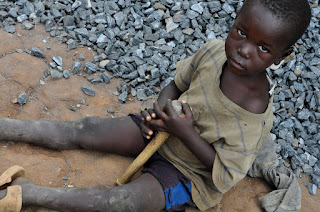Thursday, December 10, 2009
A Change in Me
Tuesday, September 15, 2009
To run or to strike?
Rounding the corner of the ring road a huge billowing truck narrowly darts inches from my face puffing a huge black cloud into my lungs. A few seconds later a motor bike nearly cuts me off but I can just see the person in yellow in the distance with his white flag waving me in the right direction. SO I discovered that running a half marathon after not running in the last 2 weeks let alone training is very difficult. I probably picked the worst place to run my first half marathon as Katmandu is one of the most polluted places I have ever experienced. I did it in 2 hours 24 minutes and thought I was going to die at about oh kilometer 15. But I did it!....and I am still recovering. I also joined in a basketball tournament that has been pretty fun. I never make plans here but I always seem to be busy busy (as Enu Ama, the woman I am living with always says). I feel like the connections I am making here are just unending. There are so many opportunities and I am meeting so many people doing such amazing things with their lives.
You may ask how I have so much time at the moment? Yes…well among the many things I am still adjusting to are the strikes. I have a specific course load I need to get through and it is often complicated by the multitude of school holidays and closures. Although there is school on Sundays there are over 55 national holidays which the school take off for and they don’t seem to be listed anywhere. The director will generally tell me a few days before that “oh hey school is closed for 3 days this week”….ok cool. But then there are the strikes that randomly occur at any moment for example. On Friday I was told hey so the Maosts called a strike so it will be difficult for the students to get home this afternoon so your classes are cancelled (however it was only my class that was cancelled everyone else seemed to be studying). Then for the afternoon class one of the teachers in the school (without notifying me) told half of my afternoon class that I said there was no class this afternoon so half of my students went home. Then a little later my director told me that the strike was going to be for 4 days so he was canceling school for the next week. So I am on vacation a little early. I now have the next 6 weeks off…and I need a break so I am taking off for the mountains.
I think the monsoon clouds might break for me I hope I hope. The air is getting dryer and hotter and the kites are soaring from every roof top and the moths are out which are all good signs that the monsoon is over.
In other good news my research is finally coming along. I had my first site vist yesterday, which was surprisingly exhausting. The road to get to where I am working is pretty rough but I learned so much from just a 1 day. The organization I will be working with Medicine du Monde is a pretty cool organization though it seems they are donating most of the time/ effort/ and supplies and while it seems like it is making a huge difference I wonder what will happen when they complete the project. I am learning about how a project is run for a major organization and the tiers of management in place to cover an area servicing 5,000 women. It seems to be very well managed and their isn’t much room for corruption to leak through which is good. They are trying to set the project up to be sustainable when they leave by creating these groups and using microfinance to generate funds from productive loans locally to pay back social/health or non productive loans. In doing so they also create these groups of women that come together from different areas of the region to be apart of something greater. The most amazing part of this so far is seeing the look on these women (volunteers) faces when they feel they really have a huge role in the communication and delivery of their healthcare.
I remember having a conversation with the head of the health program at the world bank and he told me that they had these health volunteers but had a very difficult time retaining them but couldn’t figure out why. In talking to these women who used to volunteer for the public program they said they weren’t committed to it because they felt the program was ah hem….bull shit. The meetings weren’t regular but absoutley random so they didn’t know when to show up and they didn’t feel like they were learning anything. I mean would you want to volunteer your limited time for an organization that didn’t have their act together? Of course not. This program with MDM is highly organized and the women feel like they have an extremely important role (which they do) and in 1.5 years have not missed a meeting. I would say that’s a pretty big difference. So anyway I am super excited to do this assessment I think I am going to learn soooo much and it will be fun. Ok for now I am headed off to the mountains for an adventure of a life time. Stay tuned for some crazy pictures and stories.
Monday, August 31, 2009
The Bad the Ugly and… the Good

 The road to Talupani where the hot springs await
The road to Talupani where the hot springs await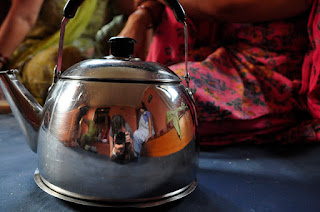
 This is the wonderful woman, Enu and her dog that I live with
This is the wonderful woman, Enu and her dog that I live withBAD:
I am not sure you can imagine 24 hours of hell but I can tell you about it. Imagine you decide that some students come up to you and tell you they want to go bungy jumping…..I said sure lets do it limit it to 15 people. Well overnight (the day before we left) 15 people turned into 50 and the 3 staff members I was supposed to have come with me turned into zero and I was stuck in the middle of the mountains with a monsoon soaked list of
names I couldn’t pronounce and 2 bus loads of 15/16 year old students I could not control. There was definitely drinking and I spent the entire 24 hours yelling at people. I quickly realized that making students of a higher cast do dishes for punishment is a culturally inappropriate thing to do (they looked at me with utter shock that I would ask them to do this). I was absolutely exhausted by the end of the overnight and experiencing bad dehydration and stomach problems on top of it all (but when you are the only staff member you don’t have a choice you can not be sick).

UGLY:
So has hellish has this trip was on my mental and physical state, I did finally get to experience my first out of Katmandu trip, which I am sad to say was not a good first trip. When people say the roads are BAD BAD BAD they are way under exaggerating just how bad the roads are. So I had to quickly get over the fact that when the buses are too crowded people sit on top of them which doesn’t seem that safe….but on consultation of

the guide book it recommended to take your pick as when the bus rolls off of the cliff you can jump off the top and survive. There are car accidents everyday here not from fast driving but from such bad roads. I mean driving on these roads (the kids must have thought I was crazy) but I really thought I was going to die. We were cruising on the windiest roads you can imagine….but wait hold that thought….you have the windy roads now had a ton of huge trucks and buses carrying people and supplies to and from the border to China….and oh wait did I mention its monsoon season and this “highway” is made of two feet of deep mud, is a single lane, and has a 800 ft drop inches from the car tire as the trucks blast their horn around every curve. I am not sure my photos do it justice.. Anyway thought I did make it home safe despite walking one section of the road. I guess I better get used to this though I will probably need to do it again soon.

The Good:
On a high note I think class went well today. We started our second unit of Poverty this week and I think this is going to be really interesting for the students. I did something I needed to do for a while which was split the students up into assigned seating which cut some of the chatter and the gender divide but we will see if it lasts. I realized that while these kids clearly know what poverty is and how to define it I am not sure if they see it in the lives of the people around them. I think this will finally be my time to get them to think. I think they no what poverty is but not what it is like to feel poverty. We talked a bit about the Caste system today and how they expect to “improve” the poverty situation if people live by
I am not sari?
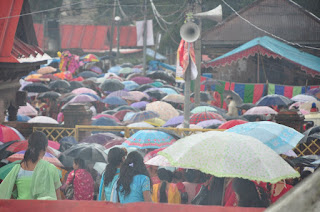



Yes where should I start its been a little too long since I last wrote sorry it is difficult to keep up with these things. So I moved to my final home here in Nepal. I now live in an area called Pulchuck with the sweetest woman, Enu, and her dog who just had puppies. I am putting a photo of them both up here. When I first moved in I had some reservations and I thought Enu didn’t like me. What the people who dropped me off failed to tell me was that she had just lost her husband a few weeks before I moved in and now that understanding more I think its good that I am living here and it gives me a chance to learn some Nepali and really get a feel for the culture. One of the first days that I moved in it was the Taij, one of the over 60 festival here. I decided to partake and dressed in red and migrated with the thousands of women to Pasupati temple for singing and dancing. I can’t believe women can comfortably wear saris around everywhere to do daily chores. To me it felt like wearing a ball gown. I guess it just takes some getting used to.

The purpose of the festival is to fast for the long life of your husband and it is the only women’s festival. This should paint an image of the gender disparity that they are trying to change here. That’s right 1 woman’s holiday… to pray for a long life for the husband.

Classes are going ok. Up days and down days. Sometimes I think they understand other days not so much. The motivation factor is really difficult for me. So far 30% of the class does the work I assign and more than half the class is failing but based on what they tell me in class an what they make me believe that some of what I say is getting through. I am trying to remember that this is new for them too and while I am still adjusting to the culture they are adjusting to my style of teaching to. Most teachers here teach from the book so they can pass their exams and the kids write it down, memorize it, and forget it. While I like to think that I am trying to get them to think and act outside the box its going to be much more challenging than I initially thought. I have huge problems with plagiarism in the class and pretty much 80% of the class when asked to write a paper will look something up and copy and paste from Wikapedia something that wasn’t even close to the assignment. I think I need to set more realistic goals for my class or take more time to explain things better.

Wednesday, August 19, 2009
The Good and the Bad
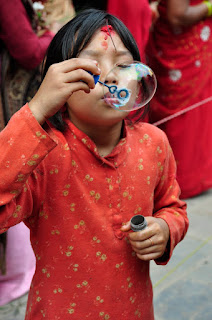

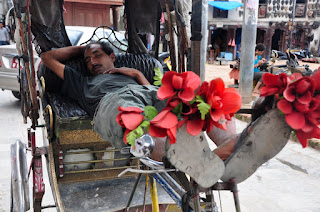

Sunday, August 9, 2009
Second Impressions: Traffic, Hashing, and Julia Roberts

My first week here in Katmandu has been an adjustme
 nt process. I have already visited the hospital....apparently I am more allergic to cockroaches than I thought and my room is crawling with them. So I had a huge reaction one day and I was absolutely covered with hives and went to the hospital. I was surprised I was in and out in less than 5 minutes. They didn't take my patient history. They asked me what was wrong I told them I thought I had an allergic reaction. Then without gloves they gave me a shot swabbed the wound with alcohol (they had no receptacle for the bloody swab so I through it in a card board box) and sent me on my way. I then got some medication from the pharmacy next door. The whole thing pills and all cost around $.75....not so bad.
nt process. I have already visited the hospital....apparently I am more allergic to cockroaches than I thought and my room is crawling with them. So I had a huge reaction one day and I was absolutely covered with hives and went to the hospital. I was surprised I was in and out in less than 5 minutes. They didn't take my patient history. They asked me what was wrong I told them I thought I had an allergic reaction. Then without gloves they gave me a shot swabbed the wound with alcohol (they had no receptacle for the bloody swab so I through it in a card board box) and sent me on my way. I then got some medication from the pharmacy next door. The whole thing pills and all cost around $.75....not so bad.

Sunday, August 2, 2009
Nepal: First Impressions
Thursday, July 30, 2009
A New Chapter: Leaving Colorado
Tuesday, July 28, 2009
Women, Hope, and Microfinance in Northern Uganda
 I think I can say that Gulu, Uganda was one of the poorest areas of the world I have ever visited. Recovering from a 20 year war, northern Uganda is a mess of displaced people, large and small NGOs, and rampant poverty. During my visit there I was working for a non-profit organization, The Women's Global Empowerment Fund that works to bring microfinance opportunities to women in Gulu. I have to say that during my time with this organization I was extremely impressed with the work that they were doing on this micro level. When it comes down to the individual, meeting and interview and following these women around I was awestruck with how much this tiny amount of money that they were borrowing had changed their entire world. I highly recommend the book The Challenge for Africa by Nobel laureate Wangari Maathai, which I read while traveling. It addresses some of these questions.
I think I can say that Gulu, Uganda was one of the poorest areas of the world I have ever visited. Recovering from a 20 year war, northern Uganda is a mess of displaced people, large and small NGOs, and rampant poverty. During my visit there I was working for a non-profit organization, The Women's Global Empowerment Fund that works to bring microfinance opportunities to women in Gulu. I have to say that during my time with this organization I was extremely impressed with the work that they were doing on this micro level. When it comes down to the individual, meeting and interview and following these women around I was awestruck with how much this tiny amount of money that they were borrowing had changed their entire world. I highly recommend the book The Challenge for Africa by Nobel laureate Wangari Maathai, which I read while traveling. It addresses some of these questions. Working with WGEFund really made me look around at all of the big NGO's in the area bouncing around in their SUV's. With so much bureaucracy do you have this same micro effect of creating change on the individual level? Do people feel like have a hand in the reformation of their country or does it feel like someone borrows their way in and takes control? How do you measure change on an individual level if you are only looking at broad statistics?
Working with WGEFund really made me look around at all of the big NGO's in the area bouncing around in their SUV's. With so much bureaucracy do you have this same micro effect of creating change on the individual level? Do people feel like have a hand in the reformation of their country or does it feel like someone borrows their way in and takes control? How do you measure change on an individual level if you are only looking at broad statistics?  I had a difficult time here trying to deal with the role of the international community in creating change. One thing I really liked about WGEF was that except for the Executive director in Denver every other staff person was from Gulu on the ground working. I learned about how important it is to build relationship with the local community and how finding trust worthy people to manage tasks is more important than the task its self.
I had a difficult time here trying to deal with the role of the international community in creating change. One thing I really liked about WGEF was that except for the Executive director in Denver every other staff person was from Gulu on the ground working. I learned about how important it is to build relationship with the local community and how finding trust worthy people to manage tasks is more important than the task its self. This job also reaffirmed my belief in microfinance as a means for change. In interviewing these women I learned that there are certainly some models that work better than others. The idea of having a for profit institution that does microfinance is blasphemous. Some of the WGEFund clients were telling me that before they had heard of WGEFund they had tried going other microfinance organizations but they had many fees or they wouldn't give them a loan without their husband's permission or the loan rates were really high. WGEFund gave them a loan that same day that they walked in and after 2 years of work WGEFund has served over 900 women and have a 100% loan repayment rate.
This job also reaffirmed my belief in microfinance as a means for change. In interviewing these women I learned that there are certainly some models that work better than others. The idea of having a for profit institution that does microfinance is blasphemous. Some of the WGEFund clients were telling me that before they had heard of WGEFund they had tried going other microfinance organizations but they had many fees or they wouldn't give them a loan without their husband's permission or the loan rates were really high. WGEFund gave them a loan that same day that they walked in and after 2 years of work WGEFund has served over 900 women and have a 100% loan repayment rate.
Tuesday, June 30, 2009
Final Products
Tuesday, April 21, 2009
Crossing the Border- Leaving Sudan is just the Beginning
 After getting back from Jordan I jumped right in on the action again and then it is back to a bus to a bus to a bus to a bus for a few hours of shooting here and there. I have spent the better part of my time this past week taking photos in two different refugee camps. One in the South in Arad and one in the North in Caramel aka Haifa. There is just so much going on in this country. Although both of these camps have the same idea, they are very different.
After getting back from Jordan I jumped right in on the action again and then it is back to a bus to a bus to a bus to a bus for a few hours of shooting here and there. I have spent the better part of my time this past week taking photos in two different refugee camps. One in the South in Arad and one in the North in Caramel aka Haifa. There is just so much going on in this country. Although both of these camps have the same idea, they are very different.
 Hiliary follwing up with a baby she helped birth last month
Hiliary follwing up with a baby she helped birth last month

Thursday, April 16, 2009
Traveling Alone as a Women in the Middle East
 Riding in a cab from Amman to Petra
Riding in a cab from Amman to Petra These are some young orthodox boys praying in the morning for the sun festival which occurs once every 28 years when the sun is in the same alignment that it was during creation.
These are some young orthodox boys praying in the morning for the sun festival which occurs once every 28 years when the sun is in the same alignment that it was during creation. So how did I get here? Last week I went to the north to Tsavt, a mountain town that houses the largest following of Kaballah (they actually rejected Madonna from buying a house in this community) to experience an Orthodox Seder....that's right Orthodox Seder. Like Shabbat rules, lots of hand washing and praying, 6 hours in length. We started the service at 8:30 at night (must be well after sundown) and at 1:30 I gave up and went to bed but the ceremony continued until 3 in the morning. I was feeling super sick at the time and was glad I could rest in such a peaceful place. It was a pretty intense experience for me and while I am glad I could get a glimpse of the Orthodox lifestyle I am glad I don't have to follow these rules in my everyday life. It made me think a lot about religion, what it is, and what it means if it is only something you visit from time to time and respect but don't strictly follow.
Then Mindy called saying that one of her women went into labor so I rushed over on the bus an hour away only to find that it was a false alarm and that her contractions which were at once every 4 minutes had completely dissipated (as I write this a week later she still has not given birth yet). Then being so close to the Northern border I changed my plans drastically. I was going to go to Egypt and sit on the beach for a few days but instead I hopped across the border to Jordan with my friend Isabel. As we are driving towards the border surrounded by lush green wheat fields and ponds I joked with Isabel "watch we are going to cross the border and be in a desert surrounded by camels". However this was not far from the truth. I wasn't sure if it was the result of ecology, economics, or policy (maybe water rights issues?) or all of the above, but we crossed the border into a vastly different countryside that was dry, poor, and yes lots of camels. Really it was shocking.
 The busy center of Amman
The busy center of AmmanJordan is a very interesting and often skipped place in the middle east. In 67' when the Palestinians "fled" everyone remembers that no one would take the refugees. Well 65% of Jordan's population is actually Palestinian the rest are Bedouins, and Jordanians that all come together in a balancing act of cultures. The country looks large on the map but is mostly made of desert so most of the people live along the eastern coast. Together, Isabel and I traveled to the capital of Amman where we had an amazing meal of foual in a bustling little tavern with live sitar music and men and women of all ages smoking however you want to call it gila, shisha or at home we call it hooka. The next day Isabel left to go back home and I headed down for Petra.
 Petra
PetraPetra was a most difficult place to travel as a woman. I was consistently hustled. I couldn't take more then 3 steps outside of my door without someone approaching me asking me if I needed help. The questions were as follows:
1: Where are you from?
2: Are you married?
3: Where are you going? I will take you
4: Come have a drink with me?
 Petra
PetraOn a good day its not an issue. I can fend them off or I just stick with the first person who comes up to me in a given time and they fend off the rest. It becomes laughable at a certain point. The positive side is that they refuse to take any money from me so I ended up getting all of my meals, groceries, and one hotel completely paid for because they refuse to accept my money.
 Petra
Petra This is one of the men who showed me around Aqaba
This is one of the men who showed me around AqabaAt this point I really just wanted to talk to a woman. I swear ever since I left Isabel I hadn't even seen a woman. The cabs, the buses, the streets were filled completely with men. Finally I negotiated with a cab to take me to Aquaba along the coast. There I treated myself to a Turkish bath (also run completely by men) where I sat in a steam room and refreshed myself and finally had a chance to relax. I walked around the town, and made friends with a man who was selling spices and had like 15 cups of tea and Turkish coffee and he set me up with his friend who took me in his glass bottom boat and I got to go snorkeling all the next day for free.
 finally relaxing on the Red Sea
finally relaxing on the Red Sea
Thursday, April 2, 2009
The West Bank: Not What You Need to Know - What You Should Know


This is Aisha asisting with a birth at the clinic we visited up in the north. I love this shot becuase it looks like the baby is glowing. You work with the light you have...this happened to be perfect!
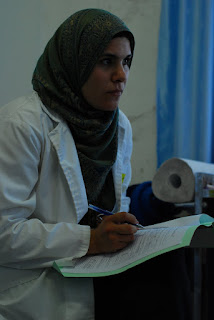 This is one of the four midwifes who works a 16 hour shift at the only birth center in all of the west bank. They see about 40 women a month and are severly underpaid. I got to see two women in labor while vising for less than 3 hours.
This is one of the four midwifes who works a 16 hour shift at the only birth center in all of the west bank. They see about 40 women a month and are severly underpaid. I got to see two women in labor while vising for less than 3 hours. The streets of Bethlahem in the morning before all of the shops are open
The streets of Bethlahem in the morning before all of the shops are open The countryside of the West Bank on the road to Jenin
The countryside of the West Bank on the road to Jenin
Dance party in Ramalla
 Ok this is a place in Hebron no one on either side is happy about. This is the only place where a settlement is literally built on top of a Palistinian town. Bellow are the arabs and above are the Israelis. This is the town where they most conflict occurs. As you can see a fense had to be built above the arab village becuase the Isreali children throw rocks and trash down on the arabs as they walk through the streets.
Ok this is a place in Hebron no one on either side is happy about. This is the only place where a settlement is literally built on top of a Palistinian town. Bellow are the arabs and above are the Israelis. This is the town where they most conflict occurs. As you can see a fense had to be built above the arab village becuase the Isreali children throw rocks and trash down on the arabs as they walk through the streets. Crowded winding streets of the UN refugee camp
Crowded winding streets of the UN refugee camp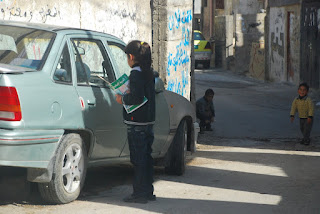 The refugee camp was full of children like this playing and running around the streets darting in and out of cars
The refugee camp was full of children like this playing and running around the streets darting in and out of cars What was once the city center of Hebron now a deserted zone of conflict in the West Bank
What was once the city center of Hebron now a deserted zone of conflict in the West Bank This is a Palistinian boy looking into the gate of a street that is illigaly closed to him in Hebron. On the otherside (what you can't see in this picuture) are armed vehicles and soliders
This is a Palistinian boy looking into the gate of a street that is illigaly closed to him in Hebron. On the otherside (what you can't see in this picuture) are armed vehicles and soliders

